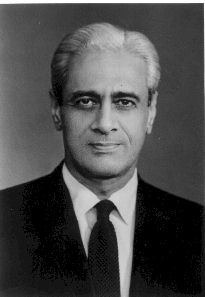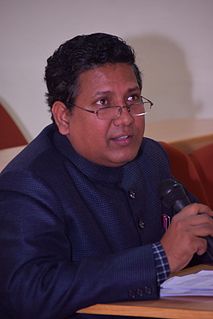The Centre for Science, Development and Media Studies (CSDMS) is a non-governmental organisation, based in NOIDA outside the Indian capital of New Delhi, that is "involved in advocacy and capacity building of local-level organisations".
Along with conducting training, workshop, and field-research projects in the fields of ICTs (information and communication technologies), it also publishes the i4d magazine, the first monthly magazine on the subject in Asia.
This institute, headed by Ravi Gupta, an alumnus of the Indian Institute of Technology of Kanpur, builds communities of practice around various sub-themes of ICT4D, undertakes research and scoping studies, and documents and monitors projects.

Shiraz Naval Minwalla is an Indian theoretical physicist and string theorist. He is a faculty member in the Department of Theoretical Physics at Tata Institute of Fundamental Research, Mumbai. Prior to his present position, Minwalla was a Harvard Junior Fellow and subsequently an Assistant Professor at Harvard University.
Community informatics (CI) is an interdisciplinary field that is concerned with using information and communication technology (ICT) to empower members of communities and support their social, cultural, and economic development. Community informatics may contribute to enhancing democracy, supporting the development of social capital, and building well connected communities; moreover, it is probable that such similar actions may let people experience new positive social change. In community informatics, there are several considerations which are the social context, shared values, distinct processes that are taken by members in a community, and social and technical systems. It is formally located as an academic discipline within a variety of academic faculties including information science, information systems, computer science, planning, development studies, and library science among others and draws on insights on community development from a range of backgrounds and disciplines. It is an interdisciplinary approach interested in using ICTs for different forms of community action, as distinct from pure academic study about ICT effects.

Satish Dhawan was an Indian mathematician and aerospace engineer, widely regarded as the father of experimental fluid dynamics research in India. Born in Srinagar, Dhawan was educated in India and further on in United States. Dhawan was one of the most eminent researchers in the field of turbulence and boundary layers, leading the successful and indigenous development of the Indian space programme. He succeeded M. G. K. Menon, as the third chairman of the Indian Space Research Organisation (ISRO) in 1972.

Ganpat University (GUNI) is a private university in Kherva, Mehsana in the state of Gujarat, India. It was established in 2005 through the State Legislative act no 19 of 2005, Government of Gujarat, and recognized by the UGC under the section 2(f) of the UGC Act, 1956 having campus spread over more than 300 acres of land with world-class infrastructure and more than 10,000 students on campus
BytesForAll is a South Asian initiative to focus on how information technology and the internet can help in taking up social development issues. It is one of the oldest ICT4D networks in South Asia. It was launched at a time when ICT4D was yet to become a buzz-word on the development circuit, and was still largely unnoticed for its potential.

Ungana-Afrika, Swahili for "connect africa", is a non-governmental organisation based in Pretoria, South Africa that provides a wide range of ICT services for civil society within and outside of Africa. It aims to better empower civil society organisations, networks and related stakeholders, in terms of ICT capacity and resources, so they may more efficiently achieve their unique social missions.

Rajesh Gopakumar is a theoretical physicist and the director of the International Centre for Theoretical Sciences (ICTS-TIFR) in Bangalore, India. He was previously a professor at Harish-Chandra Research Institute (HRI) in Allahabad, India. He is known for his work on topological string theory.
The Human Brain Project (HBP) is a large ten-year scientific research project, based on exascale supercomputers, that aims to build a collaborative ICT-based scientific research infrastructure to allow researchers across Europe to advance knowledge in the fields of neuroscience, computing, and brain-related medicine.
Richard Heeks is Professor of Digital Development in the Global Development Institute, University of Manchester, UK. He is Director of the University's Centre for Digital Development.

K M Baharul Islam is presently the Chairperson of Centre of Excellence in Public Policy and Government at Indian Institute of Management Kashipur. He served as the Dean (Academics) during 2019-2021 at the same institute. He was elected as a Fellow of the Royal Asiatic Society of Great Britain and Ireland on 18 March 2020.

The Bureau of Police Research and Development (BPR&D), was set up on 28 August 1970 in furtherance of the objective of the Government of India for the modernisation of police forces. It has evolved as a multifaceted, consultancy organisation. At present it has 4 divisions – Research, Development, Training and Correctional Administration.

Kentaro Toyama is a computer scientist and international development researcher, who works on the relationship of technology and global development. He is the W. K. Kellogg Professor at the University of Michigan School of Information and author of Geek Heresy: Rescuing Social Change from the Cult of Technology.
Salzburg Research Forschungsgesellschaft mbH is an independent research and technology organisation (RTO), located in Salzburg, Austria. The research technology organisation specializes in applied research and development in the field of information and communications technologies (ICT).

Institute of Chemical Technology (ICT) is a public deemed university in Mumbai, India. The institute also has campuses at Bhubaneswar, Odisha and Jalna, Marathwada. It is focused on training and research in fields of chemical engineering, chemical technology, and pharmacy. It was established in 1933 and was granted deemed university status in 2008, making it the only state-funded deemed university in India. On 12 February 2018 it was given status of Category 1 institute with graded autonomy by MHRD and UGC. It is also an institute with a special status as mentioned in SECTION IV of the Report of the Empowered Expert Committee in 2018.
Pan African e-Network project is an information and communications technology (ICT) project between India and the African Union that seeks to connect the 55 member states of the Union through a satellite and fibre-optic network to India and to each other to enable access to and sharing of expertise between India and African states in the areas of tele-education, telemedicine, Voice over IP, infotainment, resource mapping, meteorological services, e-governance and e-commerce services. The project is often described as Africa's biggest ever in the ICT sector and is expected to extend ICT infrastructure to rural and previously underserved areas. The project is seen as an example of India furthering its economic and strategic interests in Africa through the use of soft diplomacy and has been acclaimed as an instance of South-South cooperation, helping to overcome the digital divide in Africa.

The Indian Diamond Institute (IDI) is a Government of India sponsored autonomous higher school of learning in the fields of diamonds, gems and jewellery in India. The Institute is located in Surat, Gujarat, India and is 263 km away from Mumbai. Indian Diamond Institute is an Authorised Assayer of Department of Customs, Government of India.

Michael L. Best is an American computer scientist and international development specialist and served as founding director of the United Nations University Institute on Computing and Society established in 2015. He is professor at the Georgia Institute of Technology where he holds a joint appointment with the Sam Nunn School of International Affairs and the School of Interactive Computing.

The European Information Technologies Certification Institute (EITCI) is an international non-profit organisation headquartered in Brussels, Belgium, aimed primarily towards promotion of digital literacy and prevention of digital exclusion, by providing high quality standards for the certification of knowledge and skills in the area of information and communication technologies, in accordance to the European Commission's guidelines.

Ramadas Panemangalore Shenoy was an Indian defence scientist and writer, known for his contributions in the field of Radar technology. He secured a doctoral degree in Electrical Engineering from the University of Wisconsin–Madison and joined Defence Research and Development Organization in 1961, involving himself with the indigenous development of Radar technology till his retirement, as a Distinguished Scientist, in 1989.